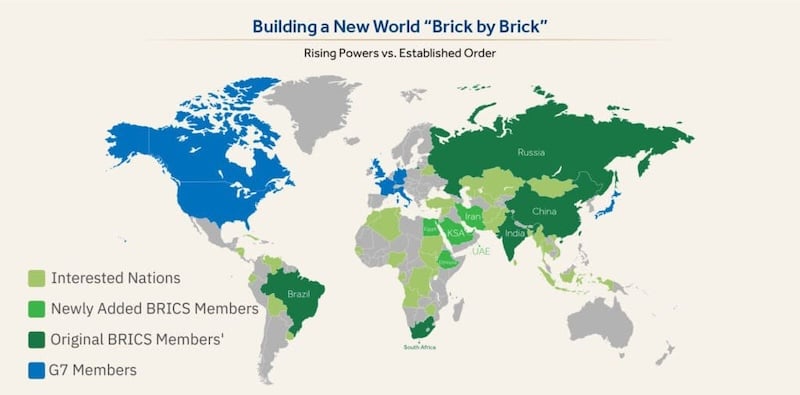by Nat Winn
When emerging imperialist projects have ascended historically, they present themselves as a progressive alternative to the established imperialist power. The British positioned themselves as more progressive than the Spanish. They said they were more enlightened and democratic. The United States posited themselves as a rising power in the 19th century that emerged out of an anti-colonial struggle and that itself did not have colonies in the way that the British empire did. Similarly the Chinese today pose themselves as a mixed economy that is less militaristic and offers more favorable and affordable conditions of trade than the now established United States empire.
None of these progressive poses, of course, were representative of the real nature of these rising powers. Each rising empire in turn became a brutal oppressor of the people on an international scale, leaving misery, death, and despair in their wake. Will China and the BRICS alliance be any different?
The BRICS alliance, which originally was meant to refer to Brazil, Russia, India, China, and South Africa, has now expanded to 10 countries. The BRICS nations possess about 45% of the world population and over 35% of the total global GDP. In comparison the G7 that includes the U.S. and some of the top economies in Western Europe possess less than 10% of world population and less than 30% the global GDP. Together the BRICS have created the New Development Bank that focuses on investing for infrastructural projects and they have collectively proposed a multi-currency exchange system that does not count on the U.S. dollar as the internationally recognized currency of global exchange.
Many progressive people have celebrated the BRICS as a counterweight to U.S. global hegemony and in fact the BRICS do represent a threat to the global power of the U.S. economy. The fact that the BRICS reflect the emerging power of countries from the global South, countries that have been historically oppressed, has led some to see the BRICS as a progressive project and to express hope that BRICS may be a vehicle for anti-imperialism and a new world order.
Imperialism is a world system made up of competing blocs of capital. It is marked by the organization of individual units of capital and the anarchy of production on a global scale that lead to wars of proxy and world wars between competing blocs of capital. Because we have lived in what many have called a uni-polar world since the collapse of the Soviet Union and the U.S. and their allies have dominated the world economy we seem to have forgotten this basic form of motion of the capitalist/imperialist social relation.
While the BRICS nations do represent a viable threat to U.S. dominated hegemony of the global order, is there anything that hints this alliance would represent a break with the current world capitalist system? Or do the BRICS merely represent a new emerging imperialist bloc of capital that would perpetuate the same imperialist system under terms more favorable to their bloc? Are the BRICS an alliance where the masses of people have real power? What are the conditions of the workers? What is the system of ownership and distribution? Certainly in the BRICS nations as they are currently constituted the answers to these questions vary from member to member. Suffice to say there are nothing like socialist relations of production in any of the current BRICS countries, including in China.
It is natural to be excited by the emergence of a counterweight to the power of an oppressive empire like the United States. The question begs itself though, are the BRICS a liberating force, or do they represent a new competing imperialist bloc of capital and the same old imperialist setup?
It is important that revolutionaries independently assess these questions in deciphering who are our friends and who are our enemies. Future articles and interviews will delve more deeply into answering the questions posed above. We will look at the economies and political systems of each of the BRICS countries. We will explore their trading relations with each other and the rest of the world. We will look at the nature of the threat they pose to the U.S. and G7 alliance and what kind of world a BRICS dominated planet might mean for the masses of the world’s people. So get ready to dig in.

